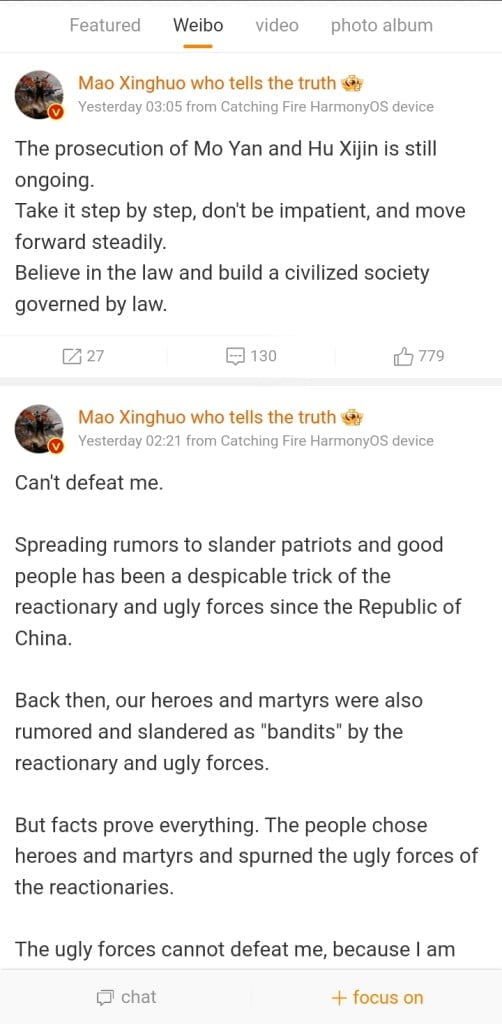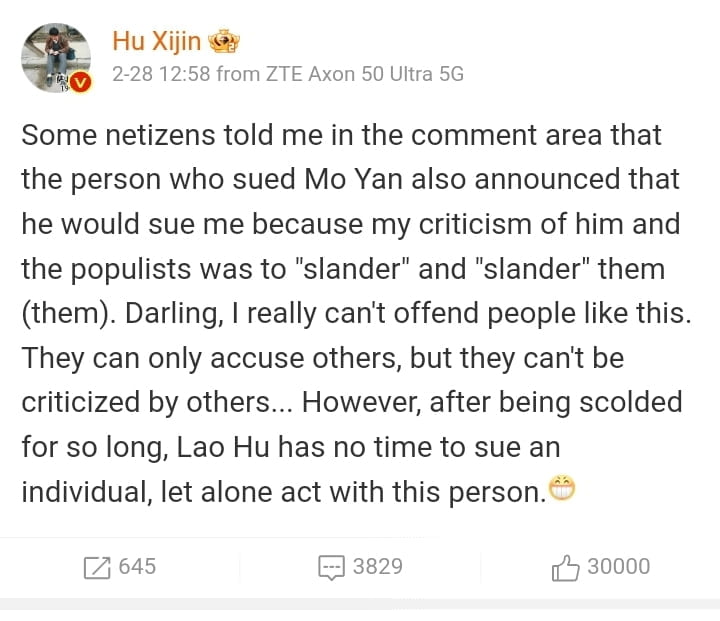Mo Yan, the celebrated Chinese author who received the Nobel Prize for Literature in 2012, is currently facing severe criticism and a lawsuit from Chinese nationalists. These critics, led by influential blogger Wu Wanzheng, also known as “Truth-Telling Mao Xinghuo,” accuse him of “distorting history” in his novels that depict China’s rural life.
Mo Yan, the 2012 Nobel laureate in literature, gained fame for “Red Sorghum,” a novel depicting a Shandong family’s saga across three generations during the Second Sino-Japanese War, recognised in China as the war of resistance against Japanese aggression.
Why is China’s only Nobel Prize-winning author Mo Yan being sued?
Wu’s lawsuit, leveraging a 2018 law against insulting national heroes and martyrs, asserts that Mo Yan’s narratives tarnish the Chinese Communist Party’s image, unjustly glorify Japanese soldiers from wartime eras, and disparage Mao Zedong, a former revolutionary leader.
The claim demands a public apology from Mo to all Chinese people, its martyrs, and Mao, alongside 1.5 billion yuan ($209 million) in damages, symbolically representing 1 yuan for every Chinese citizen. Furthermore, the suit calls for the withdrawal of Mo’s literary works from public access.
Read: Yang Hengjun: Australian writer sentenced to death in China
This legal action is grounded in legislation that emerged under President Xi Jinping’s administration, aimed at combatting “historical nihilism,” a term the Chinese Communist Party uses to describe any historical interpretation that contradicts its sanctioned viewpoint. The law is part of broader efforts to foster a unified historical narrative that supports the Party’s legitimacy.
Posting on Chinese social media network Weibo, the account “Truth-Telling Mao Xinghuo” (说真话的毛星火), said: “Spreading rumors to slander patriots and good people has been a despicable trick of reactionary and ugly forces since the Republic of China.”

Consolidation of power whilst rewriting history
The controversy has sparked a wide array of responses. Jessica Chen Weiss, a Cornell University professor, told NPR: “Mo Yan’s attracted a fair bit of attention, and in recent years, the party has really become increasingly concerned about what it sees as the roots of the Soviet Union’s collapse, including critical reevaluation of history and the appeal of Western ideas.
“And so, really, under Xi Jinping, the Chinese Communist Party leadership has been emphasizing the dangers of what they call, quote, ‘historical nihilism,’ which are views that call into question the sort of positive patriotic narratives that the CCP has used to justify its continued rule,” she added.
Read: Mongolian books face ban as part of China’s ‘cultural genocide’
The situation has also attracted commentary from Hu Xijin, a prominent media figure and former editor of the state-backed Global Times, who lambasted the lawsuit as a populist gimmick and criticised the worrying trend of intolerance for dissenting views on Chinese social media. His outspoken defence of Mo Yan prompted Wu to threaten legal action against him as well.

He is widely celebrated in China and is a vice-chair of the party-backed China Writers Association.
Mo Yan, originally named Guan Moye, is revered for his insightful exploration of China’s rural existence and the complexities introduced by the nation’s swift modernisation. The Nobel Prize committee described Mo Yan as using older Chinese literature and popular oral traditions as a starting point, combining these with contemporary social issues.